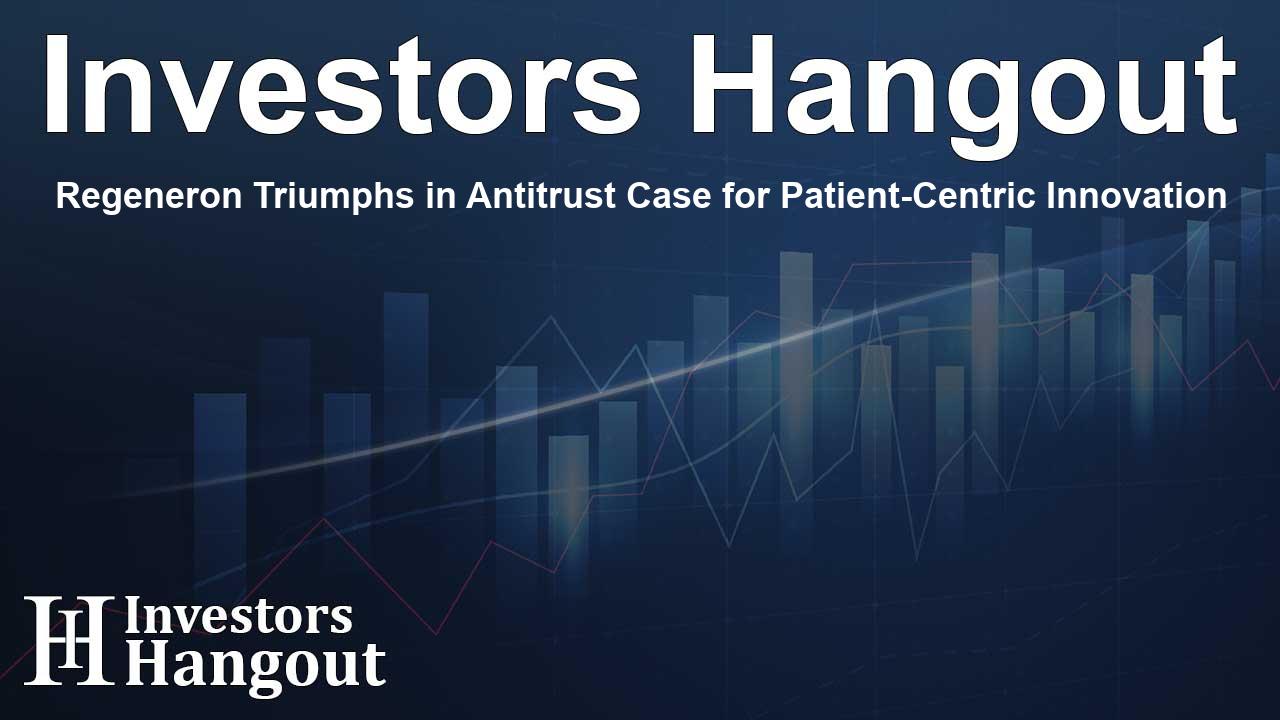Regeneron Triumphs in Antitrust Case for Patient-Centric Innovation

Regeneron Secures Important Legal Victory
A federal court jury recently delivered a significant ruling against Amgen, concluding that the company violated antitrust and tort laws by employing bundled rebates to suppress competition for Praluent (alirocumab). This pivotal verdict underscores the importance of maintaining an open and fair market for biopharmaceutical innovations.
Details of the Jury's Findings
The jury awarded Regeneron Pharmaceuticals, Inc. (NASDAQ: REGN) a total of $406.8 million in damages. This included $135.6 million in compensatory damages and an additional $271.2 million as punitive damages. This ruling emphasizes the need for ethical competition and the welfare of patients who depend on these innovative treatments.
The Mechanism of Anticompetitive Practices
Amgen was found to have engaged in a bundling strategy utilizing its established anti-inflammatory drugs, Enbrel (etanercept) and Otezla (apremilast), to unfairly position its own drug, Repatha (evolocumab), by pressuring pharmacy benefit managers (PBMs) to favor it over Praluent. This strategy was deemed illegal, as the drugs in question do not treat the same health conditions that Praluent was designed to address.
The Consequences of Amgen's Actions
The jury recognized that Amgen's actions not only hindered competition but also restricted patient access to vital treatment options. By leveraging its size and control over certain markets, Amgen effectively obstructed Regeneron's ability to succeed in a fair marketplace. This scenario deprived patients of alternatives based on clinical efficacy or pricing.
The Importance of Fair Competition
Leonard S. Schleifer, M.D., Ph.D., the CEO and President of Regeneron, articulated the significance of this verdict, affirming Regeneron’s dedication to delivering breakthroughs for urgent medical needs. He emphasized that companies must compete based on the clinical value and economic benefits of their products, rather than unlawful practices.
Witnessing the Unfolding Antitrust Issues
Joseph J. LaRosa, Regeneron's General Counsel, pointed out that since Praluent's FDA approval in 2015, Amgen's attempts to eliminate or minimize its market presence have escalated. After a failed legal bid over patent rights, Amgen shifted to an aggressive bundling technique, resulting in substantial competition loss.
Regeneron's Commitment to Innovation
Regeneron’s lead counsel, Jonathan D. Polkes, expressed gratitude toward the jury for their careful consideration. The outcome truly reflects Regeneron’s unwavering commitment to not only protect its innovations but also to ensure that patients can access vital treatments without artificial barriers.
Understanding Praluent
Praluent functions by inhibiting the binding of PCSK9 to LDL receptors, enhancing the liver's ability to remove LDL (bad cholesterol) from the bloodstream. Approved in multiple countries including major markets like the U.S., the EU, Japan, and Canada, Praluent represents a critical option for patients suffering from conditions necessitating lower LDL cholesterol levels.
How VelocImmune Technology Shapes Innovation
Regeneron’s proprietary VelocImmune technology has been instrumental in developing a range of human monoclonal antibodies. It allows for the rapid generation of fully-human antibodies, thereby facilitating the creation of successful medications like Praluent. This technology exemplifies Regeneron’s commitment to advancing medical science and patient care.
Patient Safety and Side Effects
As with all medications, Praluent may produce side effects, including allergic reactions that can be severe. Patients are encouraged to report any adverse reactions and consult their healthcare provider with any concerns. The dedication to patient safety remains a top priority for Regeneron.
Engaging with Regeneron
To stay informed about advancements and safety information regarding Regeneron’s products, patients and interested parties are invited to visit Regeneron’s official website or connect through their social media channels.
Frequently Asked Questions
What was the basis of the lawsuit against Amgen?
Regeneron accused Amgen of violating antitrust laws by using bundled rebates to unfairly limit competition concerning their cholesterol-lowering drug, Praluent.
How much did Regeneron win in damages?
The jury awarded Regeneron a total of $406.8 million, consisting of $135.6 million in compensatory damages and $271.2 million in punitive damages.
What impact does this verdict have on patients?
This decision helps ensure patients have access to multiple treatment options for managing cholesterol levels, reinforcing fair competition in the biotechnology sector.
What is Praluent and how does it work?
Praluent is an injectable medication that lowers LDL cholesterol levels by inhibiting the PCSK9 protein, facilitating more effective cholesterol clearance by the liver.
What is VelocImmune technology?
VelocImmune is Regeneron's proprietary technology used to create optimized fully-human antibodies, playing a key role in developing innovative therapies like Praluent.
About The Author
Contact Henry Turner privately here. Or send an email with ATTN: Henry Turner as the subject to contact@investorshangout.com.
About Investors Hangout
Investors Hangout is a leading online stock forum for financial discussion and learning, offering a wide range of free tools and resources. It draws in traders of all levels, who exchange market knowledge, investigate trading tactics, and keep an eye on industry developments in real time. Featuring financial articles, stock message boards, quotes, charts, company profiles, and live news updates. Through cooperative learning and a wealth of informational resources, it helps users from novices creating their first portfolios to experts honing their techniques. Join Investors Hangout today: https://investorshangout.com/
The content of this article is based on factual, publicly available information and does not represent legal, financial, or investment advice. Investors Hangout does not offer financial advice, and the author is not a licensed financial advisor. Consult a qualified advisor before making any financial or investment decisions based on this article. This article should not be considered advice to purchase, sell, or hold any securities or other investments. If any of the material provided here is inaccurate, please contact us for corrections.
